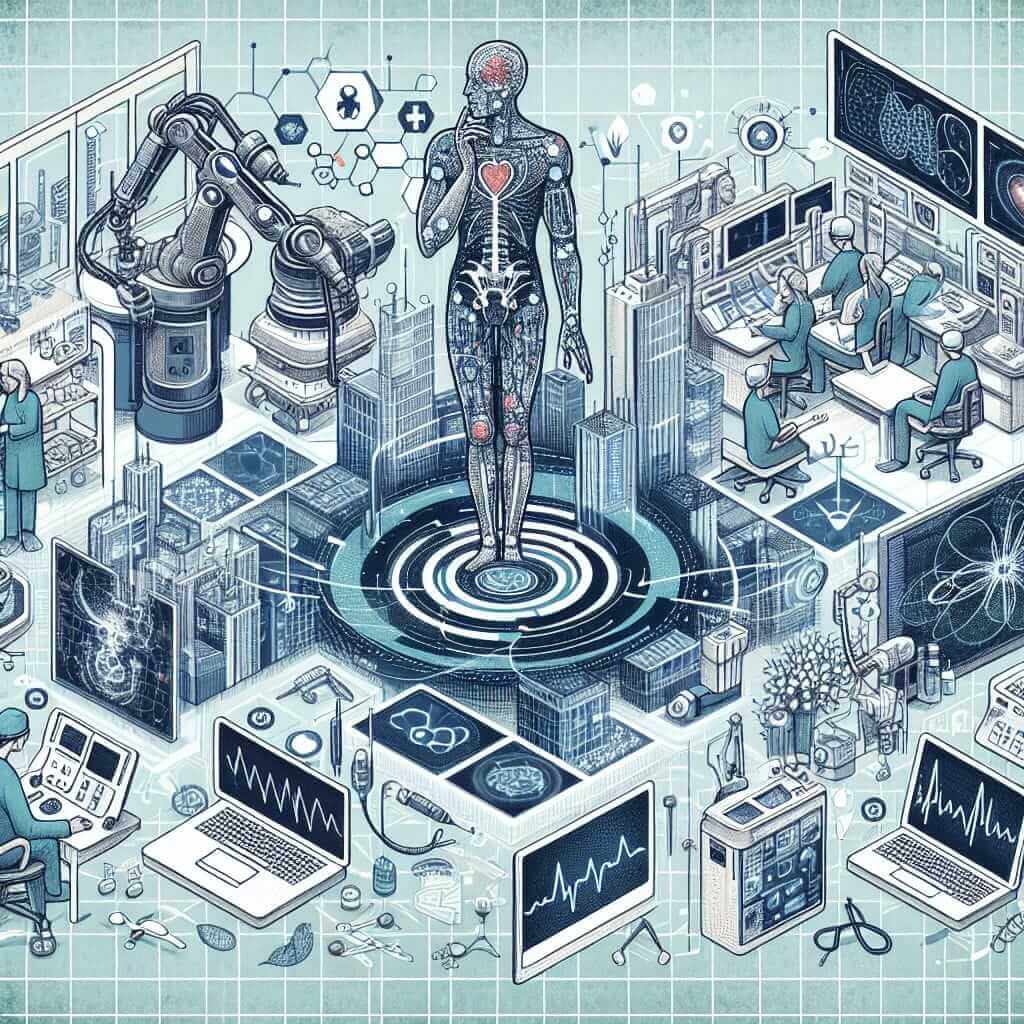The IELTS Reading section tests a variety of reading skills, from skimming and scanning to understanding detailed information, inference, and argumentation. One prominent theme that you may encounter is how technology is transforming various sectors, particularly healthcare. This topic has gained significant prominence given its relevance and essential impact in contemporary society. As technology continues to evolve, its influence on healthcare becomes more pronounced, making it a likely candidate for future IELTS reading passages.
Complete IELTS Reading Practice Passage on “How is Technology Reshaping Healthcare Delivery?”
Passage
The rapid advancement of technology has revolutionized many sectors, with healthcare being one of the most impacted. From telemedicine and electronic health records to robotic surgeries and AI diagnostics, technology is drastically reshaping healthcare delivery and improving patient outcomes.
Telemedicine has particularly surged, enabling remote patient consultations that break geographical barriers and provide timely care. This is especially beneficial in rural and underserved areas where healthcare access is limited. Patients can now consult specialists located miles away, fostering better healthcare equity.
Electronic health records (EHRs) have streamlined patient data management, allowing quick access to essential patient information. EHRs reduce redundancy and errors, enhancing the efficiency and accuracy of patient care.
Robotic surgeries and AI diagnostics represent the next frontier of technological integration in healthcare. Robotic surgeries minimize human error and increase precision, leading to faster recovery times and improved surgical outcomes. AI diagnostics leverage machine learning algorithms to analyze medical data and detect anomalies, often with higher accuracy than human doctors.
Wearable health devices like smartwatches and fitness trackers monitor vital signs in real-time, promoting proactive health management. These devices provide users with actionable insights into their health, encouraging healthier lifestyles, and facilitating early detection of potential health issues.
While technology unquestionably offers immense benefits, it also presents challenges such as data security and the digital divide. Protecting patient data from cyber threats is paramount, and ensuring equitable access to technological healthcare solutions remains a concern.
Questions
Multiple Choice
-
What is one primary benefit of telemedicine?
A. Enhances face-to-face consultations
B. Provides timely care in remote areas
C. Reduces healthcare costs everywhere
D. Eliminates the necessity of physical clinics -
How do electronic health records (EHRs) improve patient care?
A. By increasing human interaction
B. By reducing errors and redundancy
C. By lengthening the patient visit duration
D. By complicated data management processes
True/False/Not Given
- Robotic surgeries guarantee zero human error during procedures.
- AI diagnostics can sometimes be more accurate than human doctors.
Matching Information
-
Match the technology to its benefit:
- Telemedicine
- EHRs
- Robotic Surgeries
- Wearable health devices
A. Minimize human error in operations.
B. Encourage proactive health management.
C. Facilitate remote patient consultations.
D. Streamline patient data management.
Short-answer Questions
- What key challenge does technology in healthcare present besides the digital divide?
- What does AI diagnostics leverage to detect anomalies?
Answer Key
-
B. Provides timely care in remote areas
-
B. By reducing errors and redundancy
-
False. (Robotic surgeries minimize human error but do not guarantee zero human errors)
-
True. (AI diagnostics can sometimes be more accurate than human doctors)
-
- Telemedicine: C. Facilitate remote patient consultations.
- EHRs: D. Streamline patient data management.
- Robotic Surgeries: A. Minimize human error in operations.
- Wearable health devices: B. Encourage proactive health management.
-
Cybersecurity or data security issues.
-
Machine learning algorithms.
Common Mistakes in this Type of Reading Passage
- Overlooking Details: Students often skim over crucial details which lead to incorrect answers, especially with True/False/Not Given questions.
- Misinterpreting Data: Fail to correctly interpret the benefits and drawbacks of technologies mentioned, leading to incorrect matches.
- Ignoring Key Terms: Important phrases such as “especially beneficial,” “often with higher accuracy” are critical in deriving accurate answers.
Vocabulary
- Revolutionized (verb): /ˌrɛv.əˈluː.ʃə.naɪzd/ — dramatically changed.
- Telemedicine (noun): /ˈtel.iˌmed.ɪ.sɪn/ — the remote diagnosis and treatment of patients by means of telecommunications technology.
- Electronic health records (noun phrase): /ɪˌlekˈtrɒn.ɪk hɛlθ ˈrɛk.ɔːdz/ — digital versions of patients’ paper charts.
- Robotic surgeries (noun phrase): /rəʊˈbɒt.ɪk ˈsɜː.dʒəriz/ — surgical procedures performed with the help of robotic technology.
- Wearable health devices (noun phrase): /ˌwɛr.ə.bl̩ hɛlθ dɪˈvaɪ.sɪz/ — electronic devices worn on the body to track health data.
- Cyber threats (noun phrase): /ˈsaɪ.bər θrɛts/ — malicious attempts to damage or disrupt a computer network or system.
Grammar Focus
- Gerunds after Prepositions: Ensure that when a preposition is followed by a verb, the verb is in gerund form (e.g., “beneficial in reducing.”)
- Passive Voice: Used to highlight the action rather than the doer (e.g., “Robotic surgeries are performed with the help of technology.”)
- Relative Clauses: Use them to provide essential information about the noun (e.g., “Wearable devices, which monitor vital signs, are widely used.”)
Advice for High IELTS Reading Scores
- Practice Regularly: Engage with diverse reading materials to improve speed and comprehension.
- Understand Question Types: Familiarize yourself with different question formats to effectively address them.
- Skim and Scan: Develop techniques to quickly locate key information.
- Time Management: Use your time wisely, allocating it based on the complexity of the questions.

Regularly practicing with passage-based questions like these will significantly help you prepare for the IELTS Reading section and increase your chances of achieving a high band score.